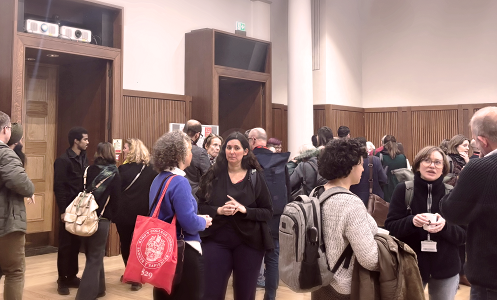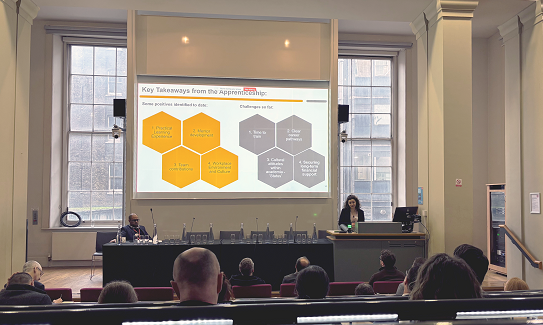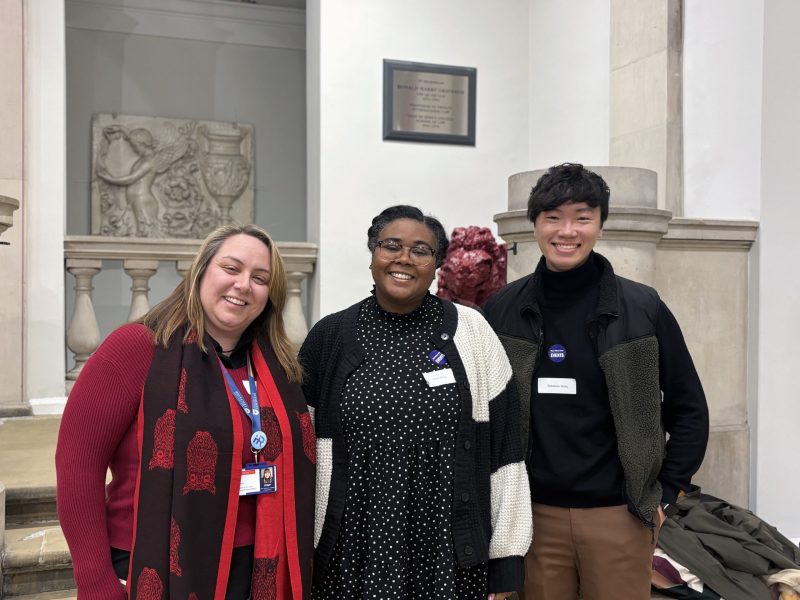Reflections on the Research Culture Symposium 2025 at King’s College London
On 8th January 2025, members of the I-REACCH team attended the Research Culture Symposium 2025 at King’s College London. As the first of what promises to be an annual gathering, the symposium explored the evolving landscape of research culture in the UK, shedding light on how institutions can adapt to meet the challenges of today while preparing for future changes, such as potential updates to REF2029.

A Visionary Keynote from Dame Professor Jessica Corner
The day began with an inspiring keynote delivered by Dame Professor Jessica Corner, Executive Chair of Research England. She set the stage for an engaging discussion on the current state of research culture in the UK and its broader societal impact. Corner emphasized the need for universities to tackle pressing societal issues through open, high-quality research. She also touched on the challenges impacting on research integrity, such as data sharing, media portrayals, and issues of harassment. Her message was clear: for research to thrive, we must cultivate an environment of trust and transparency, supported by clear, positive policies.
One particularly significant point of her keynote was the potential transformation of the Research Excellence Framework (REF) 2029. Rather than focusing on individual assessments, it’s likely that the REF will shift towards evaluating research institutions, teams, and environments. This change would shift the spotlight from traditional individual performance metrics towards measures that account for research culture, collaboration, and societal impact.

Recognizing the Critical Role of Digital Research Professionals
Moving toward discussion of diverse contributions to research culture, James Graham delivered a session on the vital role of digital Research Technical Professionals (dRTPs), such as data scientists and software engineers, in modern academic research. As Head of Research Software Engineering at King’s, Graham highlighted the disconnect between traditional academic career paths and the unique contributions of dRTPs. He stressed the need for institutions to create structured career development opportunities for these experts, supporting their inclusion and synergy with their wider research community. This is particularly relevant as many dRTPs come from fields like computer science and physical sciences, which may not be representative of the diversity of their research community and weaken their sense of belonging. As research becomes increasingly digital, it’s crucial that we acknowledge and support the indispensable work of these behind-the-scenes professionals who drive innovation through their expertise in software, data analysis, and technical problem-solving.
Cultivating Collegiality in Research Leadership
Alex Peden, Head of Research Cultures at the University of Edinburgh, introduced the InFrame Project, a collaboration with the universities of Glasgow and St Andrews aimed at redefining leadership and fostering a culture of collegiality. The session began by explored the current ideas of collegiality and the practicality of how it can be evidenced, in professional, intellectual, social and emotional contexts. With this as a key focus, InFrame uses a bottom-up method to define what really matters, creating new structures for practicing collegiality as well as rethinking existing structures. This challenges the competitive, hierarchical structures often seen in academia, and instead advocates for an inclusive approach where mutual support, mentorship, and professional development are prioritized. This shift in leadership styles, Alex argues, is essential for fostering a research environment based on collaboration and shared success, rather than one focused on individual achievement.

Building Inclusive Health Research Cultures
Dr Dan Mullins, Research Development Manager at Birkbeck, shared insightful reflections on building inclusive health research cultures. He underscored the importance of creating diverse academic workforces and collaborative research environments. Mullins highlighted several initiatives, including seed funding for diverse projects and creating platforms to amplify the voices of underrepresented groups, such as Black and working-class academics. His work is an important reminder that inclusivity is not just a buzzword—it is critical to addressing systemic barriers and ensuring that all voices are heard and valued in the research process.
Exploring the INKLUDE Project
Another key presentation for me was by Dr Hana Morel and Jasdeep Singh who presented their work on the INKLUDE Project at King’s. This multi-stream initiative explores various aspects of research culture at a local level within different faculties at King’s, with a particular focus on inclusivity. These streams are then expected to feed into and inform larger institutional developments and actions.
The INKLUDE project aims to identify and address barriers to inclusion within the research environment, promoting an inclusive research culture where diverse voices are valued. Morel and Singh shared exciting developments from the project, which includes research on how inclusivity influences collaboration, career progression, and the overall well-being of researchers. The work of the INKLUDE team is a critical contribution to understanding how inclusivity can shape a more positive and productive academic environment for all.

The Intersection of Research Culture and Integrity
Dr Stephanie Neave, CEO of UKRIO, delivered a talk that explored the intersection of research culture and research integrity. She provided an alternative definition of research culture, focusing on how research benefits society, culture, and the economy. This emphasized the importance of open communication in research, as well as the translation and commercialization of research outputs to ensure real-world impact.
What You Measure is What You Get: Research Assessment and Culture
Dr Lizzie Gadd, Head of Research Culture and Assessment at the University of Loughborough, delivered an insightful presentation on how research assessments shape research culture. Gadd argued that the culture of an institution is ultimately driven by what is measured and valued. She made an impactful statement: “Your research culture is defined by the worst behaviour you are prepared to tolerate.” This powerful message highlighted how institutional policies, incentives, and assessment frameworks play a crucial role in shaping the environment in which research takes place.
Gadd also discussed common pitfalls in current research assessments. These include adding new metrics without re-evaluating existing ones, incentivizing researchers through assessments when alternative, more effective incentives might exist, and only addressing part of the research “food chain” rather than looking at the whole ecosystem. Her talk urged us to rethink how we evaluate research, advocating for a more holistic approach where evaluation is done with researchers, not just on them, and where feedback and expertise from those being evaluated are integral to the process.

Key Takeaways: A Research Culture in Transition
The King’s Research Culture Symposium was a powerful reminder that the future of research in the UK is dynamic and continuously evolving. We are at a pivotal moment, where societal challenges and shifting research priorities are prompting us to rethink the way we conduct and support academic work.
From the anticipated changes to REF2029 to the recognition of digital research professionals and the push for more inclusive leadership, it’s clear that the future of academia must be more collaborative, supportive, and accessible. These shifts will not only enhance research outcomes but also ensure that research continues to positively impact society at large.
Looking ahead, I’m excited to see how these discussions will continue to shape the future of research culture, and I’m eager to contribute to this ongoing conversation through my work with the I-REACCCH team.
The symposium provided a unique opportunity to reflect on the evolving landscape of research in the UK. The insights shared by keynote speakers and presenters reinforced the idea that fostering inclusive research cultures is not just a moral imperative—it is essential for driving both academic and societal progress. I’m grateful to have been part of such an important conversation and look forward to continuing to engage with these issues in the years to come.

Fi Wood is the Data Officer on the I-REACCH project. Her work focuses on inclusive recruitment practices.

